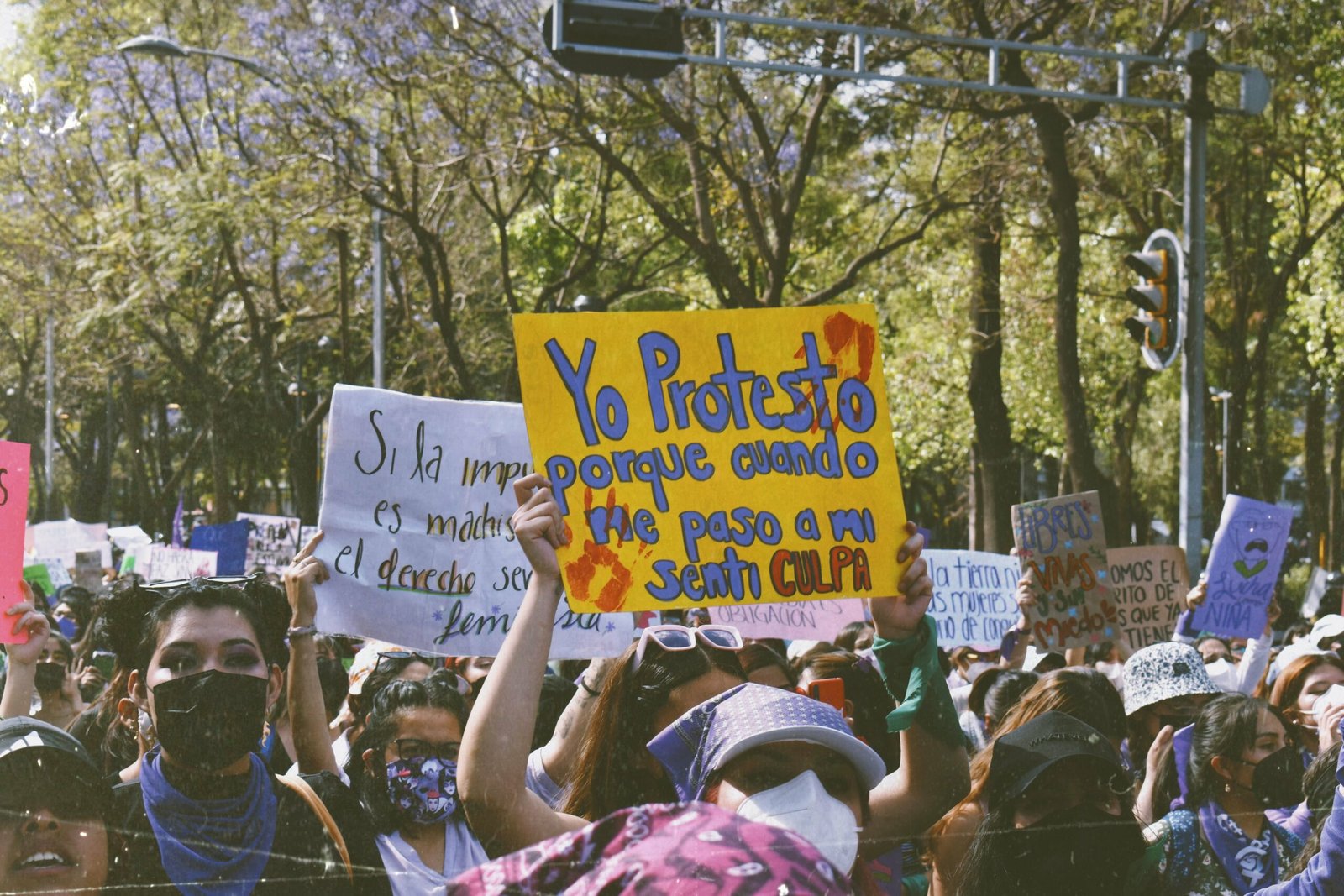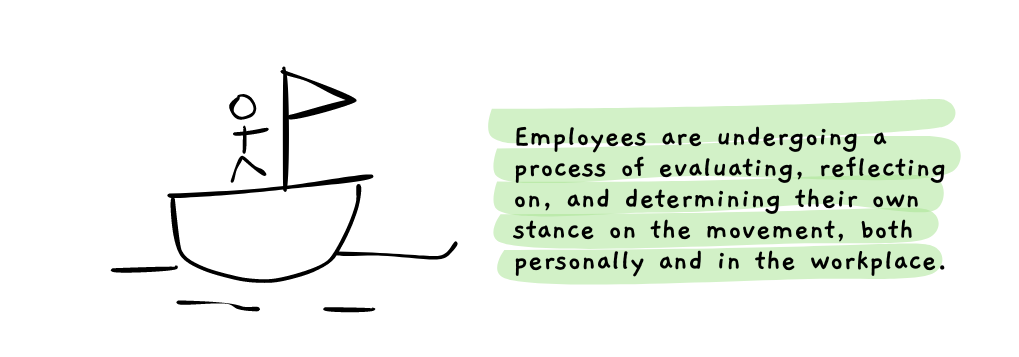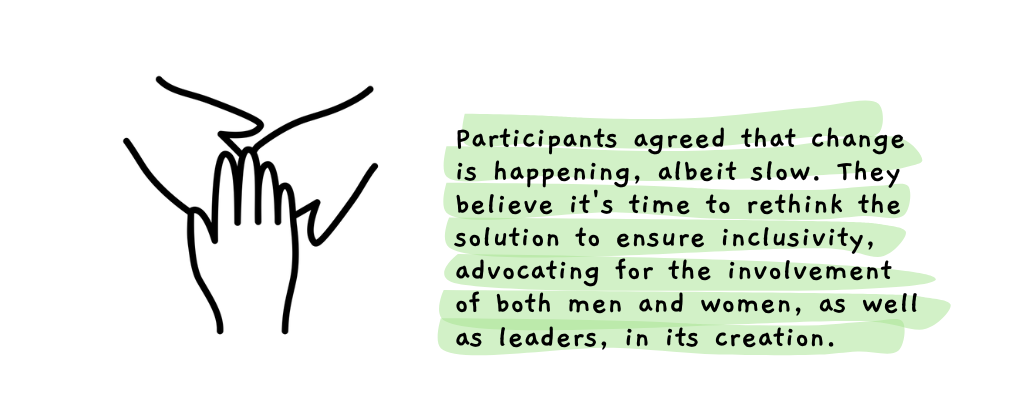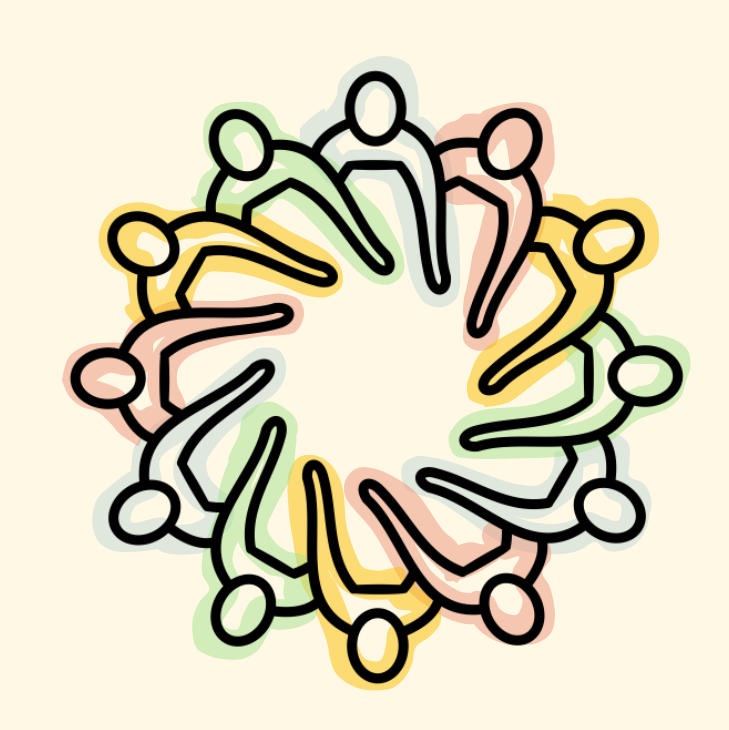Summary
This research delves into the experiences and perceptions of Millennial employees during Women’s Day on March 8th and “A Day Without Us” on March 9th, starting from 2020. Conducted as part of my Masters Dissertation at the London School of Economics (MSc in Organisational and Social Psychology) in 2023, the study involved qualitative research, including interviews with 14 participants evenly split between 7 men and 7 women from the Millennial cohort. Here are the key insights gleaned from these discussions.
The findings reveal a period of transition and ambiguity for participants in both their professional and personal spheres. On an organisational level, there is a perception of inconsistency in commitment, with participants noting a lack of genuine engagement or awareness of influence among leaders, who serve as representatives of these organisations. At a personal level, both days sparked difficult conversations with colleagues and prompted ongoing reflection on the gender equality challenges faced by Mexico. Overall, there’s a call for year-round commitment from leaders and organisations to avoid being perceived as performative solely during March 8th & 9th. Additionally, there is a pressing need for more open dialogue spaces where men and women alike can address the state of the world.
About Women’s Day in Mexico (8M) and a “Day Without Us” (9M)
Mexico finds itself amidst one of the most daunting periods in its pursuit of gender equality. Startling statistics reveal that a staggering 70% of women aged 15 and older have encountered some form of violence, spanning psychological, economic, patrimonial, physical, sexual, or discriminatory realms (INEGI, 2021). Tragically, we are witnessing the loss of 10 women’s lives each day to such violence.
Since March 8th, 2020, International Women’s Day in Mexico has transformed into a powerful platform for protesting gender inequalities and violence, with 80,000 women taking to the streets (Cerva, 2020). The momentum from International Women’s Day on March 8th extended to March 9th, with the organisation of “A Day Without Us,” urging women to abstain from their usual roles: not working, not engaging in household chores, and not caregiving.

Deciding to join this strike wasn’t an easy choice, especially given that only 10% of people in Mexico earn more than $500 USD per month. But on March 9th, organisations ran at less than 60% capacity, showing just how many were involved in the movement. The strike made a big impact, with estimated repercussions of 37,000 million Mexican pesos equivalent, around 2.1 million US dollars, considering the informal economy and household responsibilities (Aristegui, 2022).
This social issue has sparked changes in the workplaces. While some organisations have fully embraced and actively engaged in the events of March 8th and 9th, others have stayed more on the sidelines. Regardless of their level of involvement, employees are faced with decisions on how they want to approach 8M & 9M.
Inspired by recent events, I embarked on a journey of research to uncover the experiences and perceptions of Millennial employees over the past three years, with a keen eye on the impacts of significant dates like March 8th and 9th.
Through this exploration, I aim to illuminate the intricate interplay between various facets of our lives – from the dynamics of social movements to the intricacies of the workplace and the deeply personal dimensions of our existence. While the focal point of this investigation lies within the Mexican context, the insights gleaned hold relevance far beyond borders, offering a lens through which we may better understand and navigate similar issues on a global scale.
Findings
Mexican Millennials are perceiving their organisation as not “walking the talk”
In the course of our research, Millennials consistently perceived their organisations as failing to ‘walk the talk.’ This perception, shared by participants, stemmed from two distinct dimensions.

Both March 8th and 9th serve as crucial junctures for holding organisations accountable for their actions. Participants noted that while organisations often host events to commemorate these days, such as discussion panels, forums, or reflection spaces, the commitment conveyed by leaders and corporate communication during these occasions sharply contrasts with the rest of the year. This disconnect exposes instances where some organisations lack policies or guidelines to foster an inclusive workplace for women.
“It seems sometimes it’s like only the eighth and the ninth, no? And…and I also say this based on past work experiences, I think it’s like…like they only do it at that moment, and there’s no real sense of a continuous search or a constant drive to keep working to create a better workplace”.

However, leaders are the ones who are being observed most closely, as they are perceived as proxies of their organisations. Participants described feeling somewhat confused by their managers. On one hand, they expressed their commitment to 8M & 9M, but on the other hand, their day-to-day behaviour, their unawareness of gender biases, and their lack of support for gender equality initiatives throughout the year were described as blind spots.
“Because the people in positions of power are either men or women who have lost sight of or have set aside the idea of helping other women, providing mentorship, and ensuring that these kinds of issues don’t repeat“.
Participants also, described feeling uncertain about how to engage themselves on 8M & 9M, as there was a fear of unspoken consequences, ranging from feelings of disapproval from managers to the fear of not ‘climbing the ladder’ as quickly or, on occasions, loosing their job.
“I mean, I guess it’s not exactly a fear of getting fired, but I think it’s more a fear that it affects your development. You know that you might not climb the ladder as quickly or that you won’t be included in certain conversations”.
Millenials are trying to figure out how to navigate the context
One of the most striking revelations is that Millennials find themselves wrestling with the imperative to ‘make sense’ of contemporary events, all while navigating the accompanying waves of ambiguity, confusion, and disorientation (Maitlis & Sonenshein, 2010). Remarkably, they display a complex mix of attraction and aversion towards March 8th and 9th. In an era characterized by heightened polarization, the question arises: can these seemingly contradictory sentiments coexist harmoniously?

The research has unveiled a profound dilemma faced by individuals, encapsulating the tension between the ‘ways’ (protest and strike) and the ‘means’ (gender equality). This sentiment is encapsulated in a quote where a participant expresses hesitation regarding the methods employed, yet ultimately acknowledges them as the necessary path towards effecting change.
“The people who attend just to, let’s say, make noise during a protest, I mean, be violent, you know? And, of course, that tarnishes the purpose, right? I mean, it’s clear to me that, in the end, the purpose is indeed to create that noise and, yes, to draw attention to certain issues because we know that in our country, if we don’t make noise in that way, things don’t change, right?”
However, individuals are also grappling with their own emotions and reflections, experiencing personal questioning and being profoundly impacted by the magnitude of the protest and strike.
“The first year (2020) was impressive to me. It was the same for everyone else. The things you see, read, and hear on Twitter and in the media. They invited you a lot to reflect and think. What ways of thinking and behaviours have I fallen into? What ways of thinking and behaviours have my buddies fallen into? In the academic and work [spaces]. It got me questioning all those things in a very retrospective way, and looking forward.”
We are changing, and we need new ways to approach our challenges
The research has revealed that March 8th and 9th have acted as catalysts for significant questioning and reflection, both at a personal and organisational level. They have emerged as a driving force that confronts the elephant in the room regarding gender equality and the trajectory of the country. Moreover, they have spurred tangible changes.

Participants acknowledge the disruptive nature of the situation, and acknowledge the change they have seen in leaders within the last three years.
“But at least they (leaders) are open, right? So, it’s like there was a process where they ask us: why we want to protest that day? Why is it important? Why do we not have to congratulate women on March 8th? For example, I think that three years later, I can say, they understand it now. Yes. I mean, today they understand it”.
Which brings on the table, the way inclusion has been done until today. Where the discussion, reflection and solution creation has been done mainly in spaces only for women.
“Yes, there was an internal initiative led by women, which aimed to promote diversity topics. They organised events and sometimes held conferences specifically targeted at women. Personally, I wasn’t very fond of that approach because it felt too much like women-only for women, you know? I would have preferred it to be led by women, probably, but with a much more open forum”.
What now?
This research offers insight into the ongoing transformation we are experiencing in Mexico on a personal, professional and organisational dimension. In a time characterised by a desire to perceive the world in ‘black and white’, these findings shed light on the ‘greys’ that exist in between. Although my research centers on the Millennial experience in Mexico, its findings can be applied to other contexts grappling with comparable social shifts.
Through this exploration, we have gleaned valuable lessons and take aways on how we can help navigate these 8M & 9M on an organisational and leadership dimension:

Organisational support can sometimes be perceived as performative, especially when lacking long-term programmes and policies to create inclusive workplaces.
Organisations must actively work to cultivate inclusive systems and behaviours year-round.

Collaboration between organisations and their leaders is essential to promote and reinforce inclusive behaviours in day-to-day operations.
Leaders must acknowledge the significant power and influence they possess as representatives and take ownership of their role in driving inclusivity forward.

Leaders can establish psychological safe spaces within their teams, fostering an environment where members feel at ease expressing their thoughts and emotions regarding the state of the world.
These reflections can be translated into tangible changes within the team dynamics.